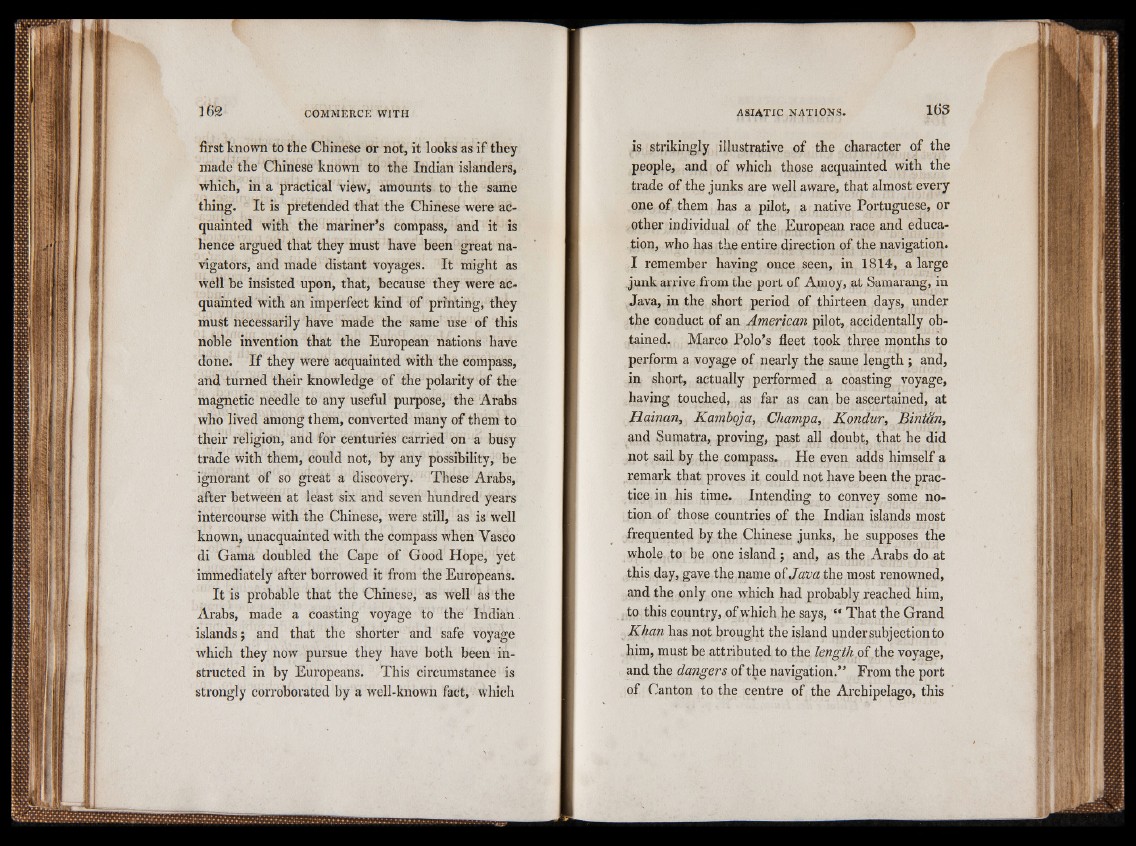
first known to the Chinese or not, it looks as if they
made the Chinese known to the Indian islanders,
which, in a practical view, amounts to the same
thing. It is pretended that the Chinese were acquainted
with the mariner’s compass, and it is
hence argued that they must have been great navigators,
and made distant voyages. It might as
well be insisted upon, that, because they were acquainted
with an imperfect kind of printing, they
must necessarily have made the same use of this
rioble invention that the European nations have
done. If they were acquainted with the compass,
and turned their knowledge of the polarity of the
magnetic needle to any useful purpose, the Arabs
who lived among them, converted many of them to
their religion, and for centuries carried on a busy
trade with them, could not, by any possibility, be
ignorant of so great a discovery. These Arabs,
after between at least six and seven hundred years
intercourse with the Chinese, were still, as is well
known, unacquainted with the compass when Vasco
di Gama doubled the Cape of Good Hope, yet
immediately after borrowed it from the Europeans.
It is probable that the Chinese, as well as the
Arabs, made a coasting voyage to the Indian
islands; and that the shorter and safe voyage
which they now pursue they have both been instructed
in by Europeans. This circumstance is
strongly corroborated by a well-known fact, which
is strikingly illustrative of the character of the
people, and of which those acquainted with the
trade of the junks are well aware, that almost every
one of them has a pilot, a native Portuguese, or
other individual of the European race and education,
who has the entire direction of the navigation.
I remember having once seen, in 1814, a large
junk arrive from the port of Amoy, at Samarang, in
Java, in the short period of thirteen days, under
the conduct of an American pilot, accidentally obtained.
Marco Polo’s fleet took three months to
perform a voyage of nearly the same length ; and,
in short, actually performed a coasting voyage,
having touched, as far as can be ascertained, at
Hainan, Kamboja, Champa, Kondur, Bintan,
and Sumatra, proving, past all doubt, that he did
not sail by the compass,. He even adds himself a
remark that proves it could not have been the practice
in his time. Intending to convey some no-
tion of those countries of the Indian islands most
frequented by the Chinese junks, he supposes the
whole to be one island j and, as the Arabs do at
this day, gave the name of Java the most renowned,
and the only one which had probably reached him,
to this country, of which he says, “ That the Grand
Khan has not brought the island under subjection to
him, must be attributed to the length of the voyage,
and the dangers of the navigation.” From the port
of Canton to the centre of the Archipelago, this